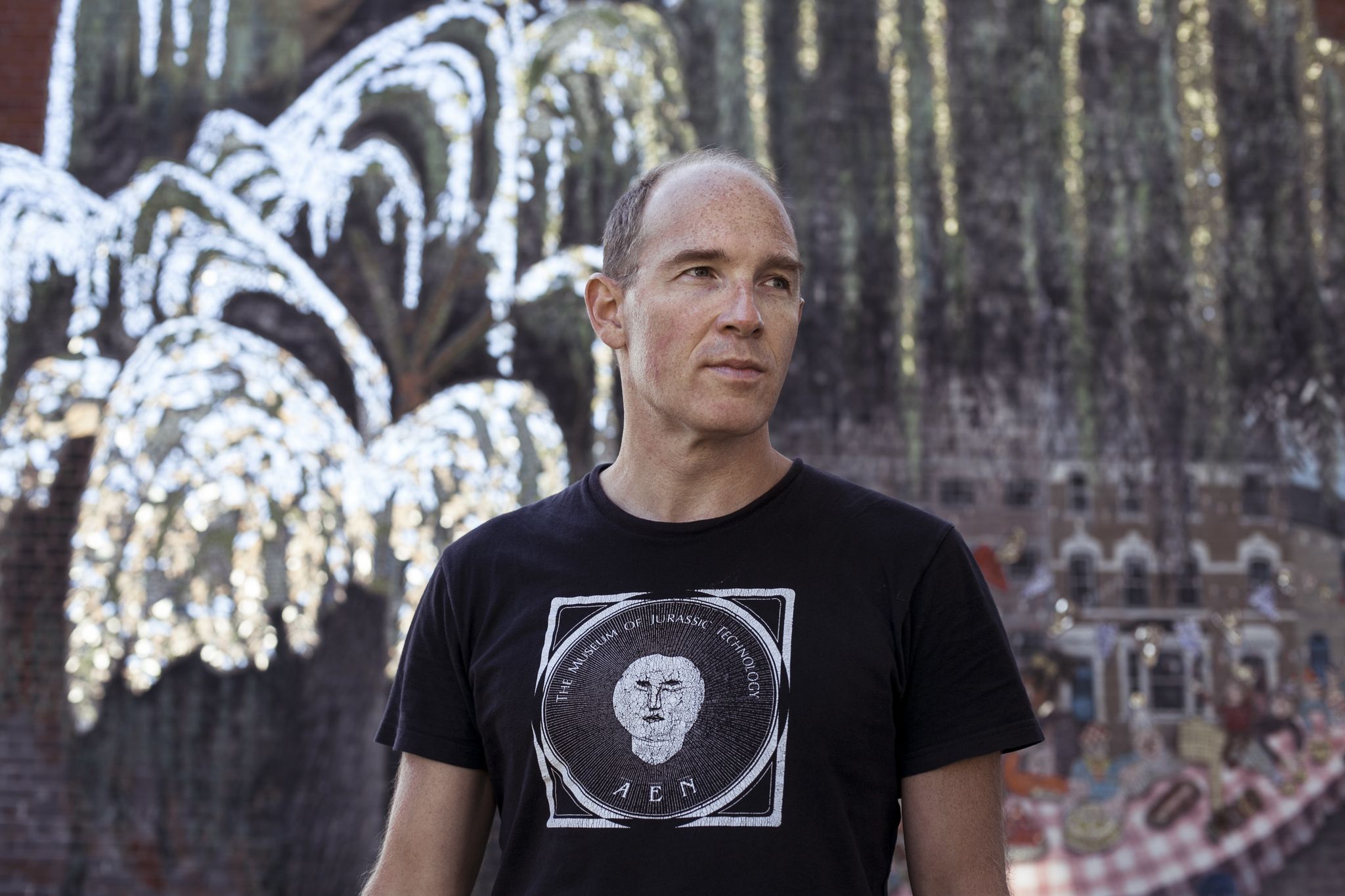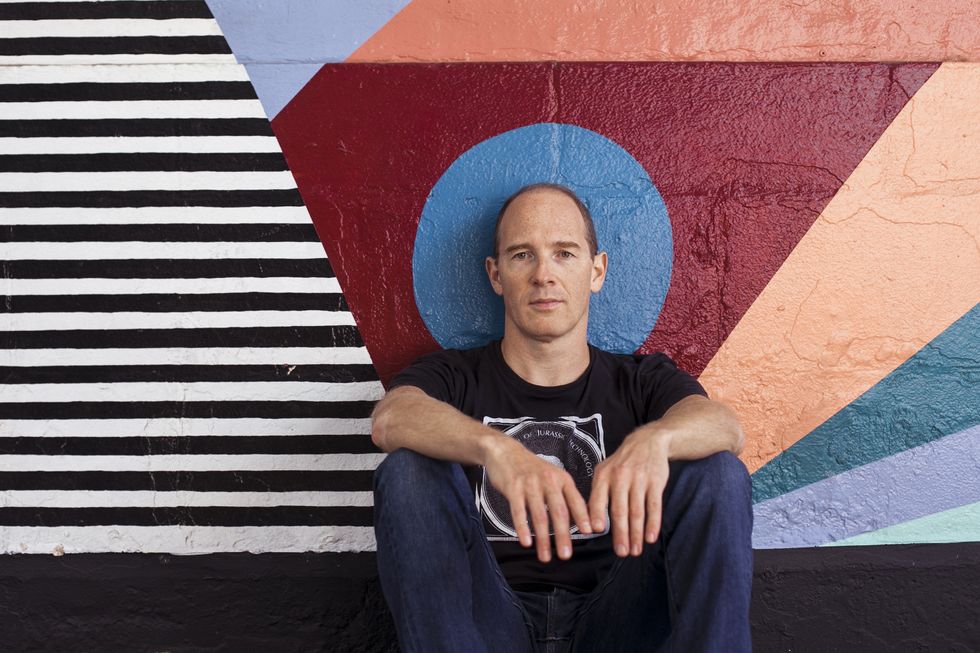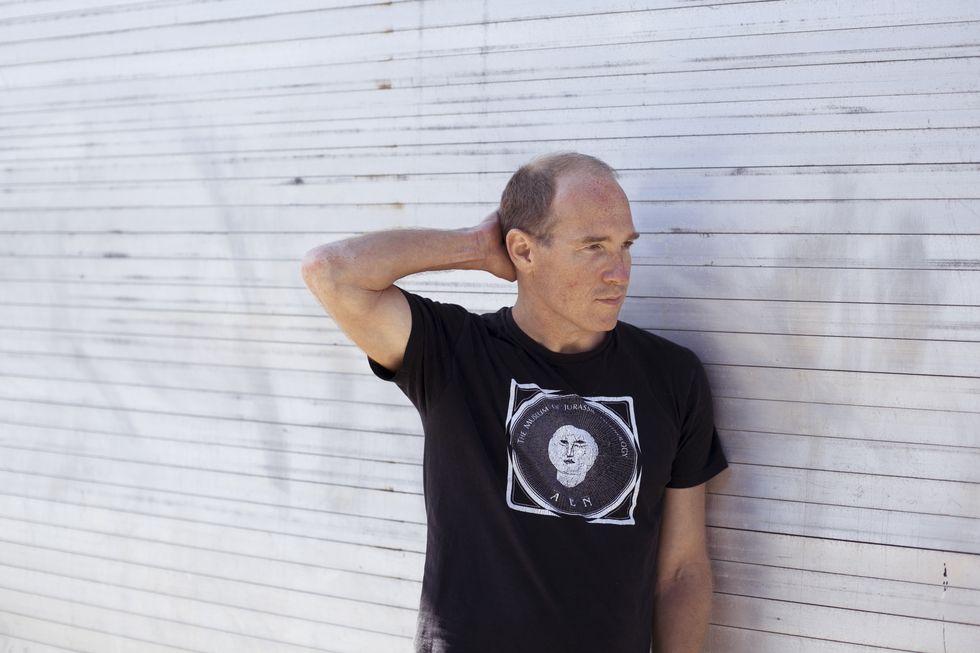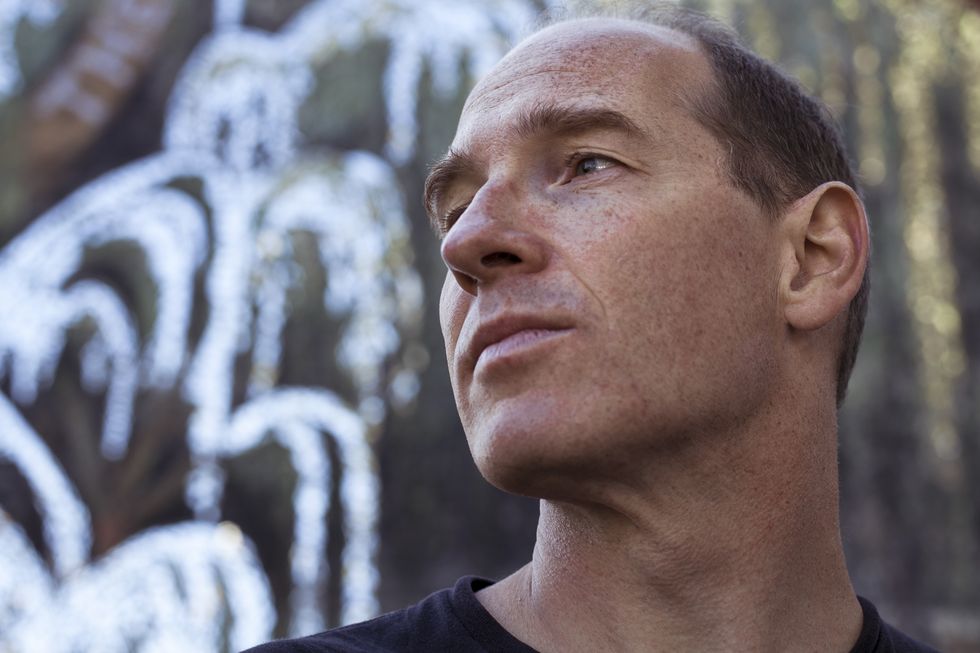Six years ago, in the summer of 2014, one track infiltrated clammy nightclubs, drifted out of the window of cars and caused sun-dappled festival crowds to slowly sway together. The widespread success of 'Can't Do Without You' was bemusing to Dan Snaith, the man who released the track as Caribou, and who also DJs under the moniker Daphni when playing more rousing techno.
It catapulted him into the mainstream, giving him the kind of broad audience he never imagined a self-confessed electronic music geek would ever achieve. He was surprised as he saw it played on Eastenders, or as it followed him around cafés and shops. Snaith, a 41-year-old Canadian, seems generally bemused at the position he is in: a teetotal former mathematician, whose music is rooted in obscure genres such as krautrock and IDM, but has become wildly popular.
Over the years a particular feel to a Caribou track has emerged: a sunniness tinged with sadness as Snaith's vocals drift over of the music, and a sound which straddles both electronic and pop music. "I’m kind of half in and half out of everything," he tells me. "When I’m in the world of dance music people see me as the band guy, and when I’m in the song world people think I’m an electronic music DJ."
This month he releases his fifth studio album, Suddenly, a record which still revels in the liminal space between those worlds, but branches out further, with esoteric piano melodies and hip-hop influenced fused together in tracks like 'Sunny's Time', which twists into a woozy trap beat out of nowhere.
Suddenly is about the moments when your life changes in an instant: a phone call delivering bad news which draws a line under what life was before, or a story in the news which reveals something you didn't realise was going on all along. It's also a record filled with unexpected twists, which pull the rug from underneath you as you listen.
Earlier this month, in a small café in Stoke Newington, Snaith, whose mellow and thoughtful way of speaking feels not entirely dissimilar to his music, discussed the process of following up from his successful last release and the seismic personal changes that inspired Suddenly.
Going back to Our Love and the journey from the end of that album. It had such an amazing fan and critical reception. How did you feel finishing and touring it?
The whole thing with that album was that I made it with the people that were going to hear it in mind, especially ‘Can’t Do Without You’, and so to go out on tour and have that reaction felt really good. I came back from that feeling very affirmed in the whole process and I think that was why I felt reassured to do something weirder and more personal and intimate [with Suddenly] because it felt like a vote of confidence in me.
Did you notice ‘Can’t Do Without You’ had a different reaction when you started playing it out? Could you feel energy around that track?
With Swim, ‘Sun’ became a club thing in Ibiza and there were lots of remixes that I didn’t see coming at all, and on the Swim tour there was some moments where I thought, 'Whoa this is different, something is happening'. But ‘Can’t Do Without You’ I could feel being a summer festival song, and Our Love kind of went the way I expected it to and then kept progressing.
It felt like a song that was everywhere, did it feel like that to you?
I was watching some BBC show about a high school in Mississippi and they got to the prom scene and, obviously in that high school they’re not listening that song, but it was the music they put over it. It was in Eastenders, it was in this Seth Rogan movie. It’s one of those songs that’s permeated beyond dance music and a lot of people who aren’t into club music love it.
Did you see your music having a life outside of nightclubs and venues?
It’s natural because I’m always incorporating disparate things, so something that straddles both pop and electronic music makes sense for me. The thing I never expected my music to have is some kind of popular relevance because I always thought of myself as some kind of weirdo music nerd and all the music I liked was quite niche. So that’s been really lovely to have that happen, unexpectedly.
Have you felt a pressure to have a new ‘Can’t Do Without You’ on this album?
I’ve thought about that, that people are going to expect there to be a big song on the next record. My reaction to that was that I’ve got to not chase that, because I’m not just making this album. I know enough musicians who have got a taste of commercial success and tried to follow it and it goes off the rails. So I kind of went the opposite way and made a weird record with lots of eccentric elements, but with some tracks that are quite poppy still. I think the best thing is for me to follow my musical interests and my nose rather than thinking there has to be this or that.
Suddenly came from your daughter repeatedly saying the word, how did it go from that to becoming the album title?
I never have a title and I hate naming songs and albums. I’ll have the music totally finished and mastered and the record label will ask, ‘What is the album called?’ and I have no idea. At that point I didn’t have a way of putting it into one package or making sense of it. My daughter is almost three and she’d just learned the word 'suddenly' and kept saying it all the time. My wife noticed and suggested it. But then, I think my wife thought of it more in reference to the musical changes.
How so?
The left turns in the music, there’s several moments on the record where something totally unexpected happens. I started thinking about that and played the album to various friends who then used the word 'suddenly' when referencing it. I thought, hang on, these big personal sudden shifts in my life during the time of making the record, those have defined the shape of my life and are what this album is about.
What do you mean by those personal shifts?
In my wife’s family there was a death from a heart attack. The phone rings and it’s her parents and the whole world kind of melts. My dad had a serious health crisis, there was a divorce in my wife’s family, on and on. Those events where somebody calls you and the world is different from that point onwards. I’ve also realised, thinking about the last five or six years, we’ve all had those moments, like waking up after the Brexit vote or various elections and thinking, ‘Oh my god this world is different from the one I thought I was in’. There’s a song specifically about the #MeToo moment on here [the track 'Sister']. It’s partly a symptom of my age I guess, these kind of things will happen.
Can you talk about writing 'Sister'?
It really shook the foundations of what I assumed about the world. Obviously I knew sexual violence and harassment of women was an issue in society, but I just had no idea how pervasive it was. Talking to female friends and seeing their social media feeds was on a whole different scale to what I was aware of. There were two people I knew in the music industry, actually more, I don’t want to name names but people who I knew were called out publicly in the press, some of them admitted wrongdoing and committed to changing and some denied it. It made me think, I thought I knew these people and that the people you meet in the same sphere as you are good people. The ‘bad eggs’ and perpetrators are the kind of people I never meet, the sleazy horrible people.
That really shook me, because I’m quite an optimistic trusting person. Also I have two daughters and a wife, my 22-year-old niece lives with us and I grew up with two sisters and my mum, so my life has always been in female environments and that made me feel even worse. I should have been the person who was clued into this. The song is a commitment to being more aware and part of the solution.
Suddenly was created from 900 drafts, how do you bring that many ideas together to make an album?
The process is that every day for five years I would go down into the studio in the basement of my house and make one or two loops and really not worry at all about whether they’re going to be on the album or whether they sound like Caribou, just enjoying starting from nothing and seeing what happens. Then those just accumulate day after day and I put them in a big playlist and at some point I start thinking, ‘I need to figure out if this is heading anywhere’. There are tracks made in 2015 and tracks made in 2019 and everywhere in between that ended up on the record.
How do things get picked or cast aside, is it a gut feeling?
It is a gut feeling, yeah, I think I’m pretty good at getting a sense for it, but then, 900 is so much music it’s impossible to keep it all in your mind and so I rely on my feedback from my wife and Kieran [Hebden, the artist Four Tet] the two of them help give me a bit more direction. Tracks like ‘Home’ or ‘Never Come Back’ were obviously something I wanted to finish, and then there’s like 500 ideas I never need to listen to again. But then there’s a hundred in the middle that could be good with the right melody but I can’t finish all of them, it’s too much time. That’s when I need the input of somebody else I trust who is not going to bullshit me about whether they have potential or not.
It’s quite common now, especially in a genre like rap, if you have that much material to just release two albums back to back with 20 tracks on each so you’ve got endless material to stream and tour with. Do you make a conscious decision to keep your music very concentrated and finite rather than putting everything out there?
Obviously the incentive in terms of making money in music is to have as many songs on Spotify as you possibly can and give people a new one every week. It’ll be interesting to see what happens with the discographies where there’s a billion tracks in them and how people make sense of them looking back ten or twenty years from now. I do feel that I’ve seen people who release a lot of music [at once] and I see people’s fatigue set in. Looking at those 900 tracks, they don’t all need to be out there, they all represent the same collection of ideas.
Do you like idea of people listening to the album the whole way through and having that cohesive feel of it being heard together?
The narrative around music listening these days is that nobody listens to albums, but the people that are really interested in music probably do still listen to a whole album, even if it’s only once or twice, and then they pick out their favourite songs. I have a sense of letting go of it and I'm OK with people saving one song in their library to listen to. I’m not super precious about it.
Are you aware of balancing dancey tracks like ‘Home’ and ‘Never Come Back’ with more low-tempo and obscure moments?
I did get to the point making this where I thought ‘What is this album?’, maybe it will be super mellow and weird. Then I made ‘Never Come Back’ very quickly one day and it was exciting, but it’s not pushing an envelope in any way. I thought it might be useful to have a track people are tapping their toes to and want to move around to. It should also be said the last five years of my life have mostly been very happy, I like that it has the more contemplative moods but also has upbeat and sunny moments, that’s very much a side of my personality.
Caribou has this warm, euphoric sound but with a tinge of sadness to it. Is treading that line of happiness with a sense of melancholy an area you enjoy exploring?
Yeah, I love that. I would say that’s something that music does uniquely well, it has the ability to have contradictions in the emotional tone in it. Sometimes I’ll just try and make a banging techno track and then I’ll always end up putting in some chords, the warmth and positivity are something I can’t get rid of it because it’s so essentially me. Then the melancholy, wistful, nostalgic sound, on this record it has a lot to do with the subject matter of the songs, but I love those tracks which make you want to dance and cry at the same time. Oh, that sounds terrible!
You sing on every track on Suddenly for the first time, has that affected the way that you write the songs?
I’m not a natural singer and it’s taken me ages to gradually become more comfortable with singing, but at some point it becomes hard to say you’re not a singer when you’re singing every night in front of a big crowd of people. Having done a bunch of Daphni music previous to this I really wanted to go back to songs which have my voice in there. The singing makes me more attached to the music and through talking to people I know that’s what people who listen to it feel close to.
What are the artist and albums, electronic and otherwise, which have influenced this album?
I always make a list of album influences and it’s really diverse this time, with lots of weird old forgotten music and contemporary music too. The big record that allowed me to figure out the tone of the more intimate sounding stuff is this album by Beverly Glenn-Copeland called Keyboard Fantasies. It’s this incredibly warm and emotionally potent album but has that sense of processing something very emotionally difficult to make something positive out of it. On the production side of things, lots of mainstream US hip-hop and R&B and the kind of swampy dislocating synth sounds have had an influence on me. For example, ‘Sunny’s Time’ switches into a part that more references that world half-way through.
Do you think the way hip-hop has started using Auto-Tune has blurred line between dance music and rap/hip-hop?
When I was growing up that line between pop and underground electronic music was completely different world. Now I have friends who have worked on Kanye, Rihanna and Solange albums. Even if you think of the most popular thing you can think of, like Taylor Swift or Billie Eilish, they’re all made using same tools, software and couple of bits of equipment, so it’s all electronic music I guess.
How do you decide what is a Daphni and what is a Caribou track, is it a very distinct thing for you?
It’s more about what I’m thinking when I sit down to make it. If I’m aiming to have something to play in a DJ set, that’s when the Daphni stuff gets made. It has to be able to be played in a club and I have to think about whether, say, my friend Ben UFO would be able to play this track. This album I can’t imagine people actually playing in their sets, they are too pop sounding, which was kind of the idea. ‘Ravi’ could have been Daphni easily because it ended up being a propulsive condensed dance music track, but it’s Caribou because I started out making it with vocals and a big chorus.
Do you play less DJ sets and more events/festivals now?
This year the focus is all about Caribou and we haven’t played in years so that’s what I’m desperate to do again. I would DJ more, because I love it, if I had more time in my life. The nice thing about Daphni is that there’s no pressure to promote it because I’m very fortunate in that I already have a job so I can just do it for fun. I show up with a USB stick and I don’t have a clue what the first record I’m going to play is. That’s the same in Leeds at a 150-person charity gig as it is at Coachella, it’s just fun and I want to keep it like that so they fulfil totally different things to me.
You moved to London in 2001, what has kept you here and do you think it’s changed?
Compared to somewhere like Manhattan it’s a great place for music, I know it’s hard for small clubs now but there’s still so many places to play. To be honest when I first moved to London there wasn’t really as much variety in the club world, there was Fabric and The End and Turnmills, and now there’s always a new place in Tottenham or Peckham. In fact I couldn’t imagine a more vibrant electronic music scene to live in in the world. Berlin people talk about there, but for me the music here is more in my world.
You don’t drink or take drugs, do you feel like that’s an interesting position to be in as someone who makes music for clubs?
It’s more common than you expect, but I’m in the very nerdy end of the club world. When I was at middle school I would just gravitate towards the people who were the first to take drugs, not because of that but because those were the people who wanted to try different things and were less uptight. I’ve spent my whole life being the sober person who was around people who were fucked up. I’m aware obviously that people are doing drugs and drinking, but it never makes me feel like a fish out of water because that’s the way it always is.
You used to be mathematician, do you feel the music you make satisfies any of the same parts of the brain?
I started liking maths when it stopped being about memorising and became more about playing around with ideas, because at that level it's more creative and abstract. There is a sense of when things fit together nicely in both of them, in abstract mathematics two ideas will just fit, and in music that’s the same thing I’m looking for.
I imagine you’re sometimes recognised at festivals or gigs but not stopped in street often, is that nice level of fame to have?
I am occasionally in this neighbourhood because there’s a lot of musicians here, but we toured with Radiohead so I’m well aware of what it’s like to be chased down the street. Occasionally my daughter will be like, "Dad are you famous?", and I’ll say no, I mean I’m not objectively. I have people who are interested in what I do and occasionally want to come up and take a picture and that’s nice.
Do your daughters listen to your music?
Their experience of me is hearing thump thump thump in the basement the whole time, but my older one came down and said, "Dad can I come and listen to the album?". She was like, “I think ‘Home’ is going to be your most successful track ever”. I'm not sure where she got that from.
You talked about wanting to continue making albums, will you go back and make a Daphni record next?
I’ll have toured [with Caribou] for so long so maybe I’ll want to do something more spontaneous and club related, but I may not. Sitting down to make this album I had very little clue of where it was headed. It’s an exploration, that’s what is fun about it.
How do you measure your success, is it in ticket sales or how you feel about your work or something else?
It’s being able to sit with it and think that I did the best thing I could have done. Musicians have a finite life span and after a point their music becomes less relevant and interesting. That may have already happened to me and people aren’t telling me, but it’ll happen at some point. For me every album is like, ‘I can do it one more time!’, and I have to try and do something which stands up to the other stuff I’ve made
Suddenly is out 28 February
















